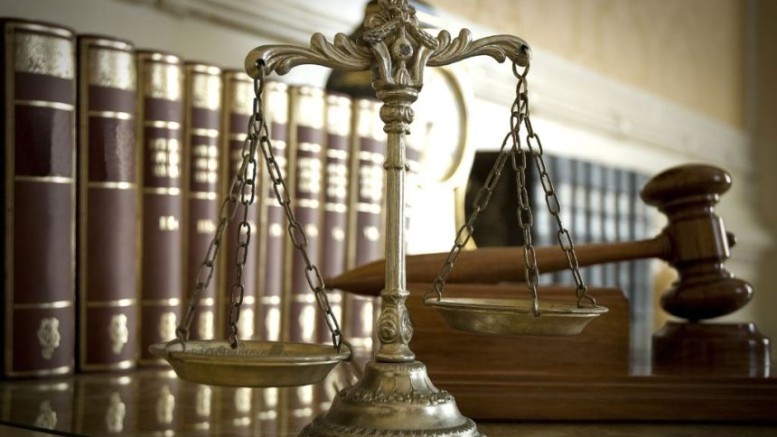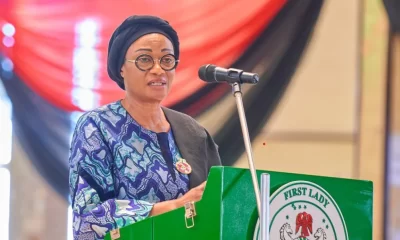Comments and Issues
Judiciary: State capture and stockholm syndrome
Published
4 years agoon
By
Olu Emmanuel
By Emmanuel Onwubiko
Recently, a beautiful black judge by name Ketanji Brown Jackson was confirmed by the powerful American Senate as the first ever Black woman to serve on the illustrious bench of the Supreme Court of the United States of America.
She got her confirmation by a vote of 53-47 and she replaced the retiring Supreme Court’s justice Stephen Breyer for whom she previously served as a law Clerk.
She, Miss. Ketanji Brown Jackson will be inaugurated after Breyer’s retirement takes effect at the end of the 2021-2022 Supreme Court term.
“I have dedicated my career to public service because I love this Country and our Constitution and the rights that make us free,” said Jacksonin comments at the White House following her confirmation.
“It has taken 232 years and 115 years prior appointments for a black woman to be selected to serve on the Supreme Court of the USA”, she said. “But we have made it. We have made it, all of us…in my family, it took just one generation to go from segregation to the Supreme Court of the USA”.
She is a 1996 graduate of Havard Law School but she accumulated a great deal of experiences working through the Court System of her Country.
Ketanji Brown Jackson said her passion for her Country remains her inspiration for opting to be a judge and now she has been able to dismantle all the formidable racial segregation and all the scheming and subterranean plots to keep her away from attainment of such a lofty judicial height and today she has made it to the Supreme Court of the United States of America and for her the Constitution is her abiding tool.
This phenomenal appointment of such a very young, delectable and beautiful black American lawyer to sit on the bench of the highest court of the World’s most powerful nation (USA), happened coincidentally at a time that a damning but factually accurate investigative report of the state of the Nigerian judiciary was released by the most powerful political department of the government of the USA known as the State Department.
This department generated the ingredients for putting up this report from a variety of sources including investigations conducted by independent observers and analysts in Nigeria and of course from a collection of profound reportage conducted by Non Governmental institutions working in the justice and human rights sector of Nigeria.
The media in Nigeria is also a fertile ground for harvesting such credible reports because those who wear the shoes and go through the pains of being harassed for bribes for judgments are always speaking out one way or the other through the media of mass communication and largely through the vibrant social media.
The new report by the United States Department of State alleged that the judiciary in Nigeria remains susceptible to corruption and is constantly under pressure from the executive and legislative arms of government.
In its “Country Reports on Human Rights Practices for 2021,” the US stated that although the constitution and law provide for an independent judiciary, political leaders influence the judges and lawyers, particularly at the state and local government levels.
The document added that there was a widespread public perception that judges were easily bribed, and litigants could not rely on the courts to render impartial judgments.
“Many citizens encountered long delays and reported receiving requests from judicial officials for bribes to expedite cases or obtain favourable rulings,” the report stated.
It listed understaffing, inefficiency, and corruption as factors preventing the judiciary from functioning adequately.
Other challenges, the US stated, included the absence of continuing education requirements for attorneys coupled with the fact that police officers were often assigned to serve as prosecutors.
The report further alleged that judges frequently fail to appear for trials, stressing however that the salaries of court officials are low, and officials often lacked proper equipment and training.
“The constitution and the annual appropriation acts stipulate that the National Assembly and the judiciary be paid directly from the federation account as statutory transfers before other budgetary expenditures are made to maintain their autonomy and separation of powers.
“Federal and state governments, however, often undermined the judiciary by withholding funding and manipulating appointments,” the US report noted.
Speaking to the issues and problems with trial procedures, the US government asserted that although defendants were presumed innocent and enjoy certain rights, authorities do not always respect these rights, most frequently due to a lack of capacity.
“Insufficient number of judges and courtrooms, together with growing caseloads, often resulted in pre-trial, trial, and appellate delays that could extend a trial for as many as 10 years.
“Although accused persons are entitled to counsel of their choice, there were reportedly some cases where defence counsel was absent from required court appearances so regularly that a court might proceed with a routine hearing in the absence of counsel, except for certain offences for which conviction carries the death penalty,” it alleged.
According to the document, in some cases, the police would demand additional payment from family members who wanted to attend a trial even as the authorities could hold defendants in prison awaiting trial for periods well beyond the terms allowed by law.
The US state Department report alleged that Nigeria’s anti-corruption agencies, the Economic and Financial Crimes Commission (EFCC) as well as the Independent Corrupt Practices and Other Related Offences Commission (ICPC) were mainly focused on pursuing low and mid-level corruption cases.
The US stated that although there had been a few indictments of active top level government officials, the cases were being hampered by administrative delays.
The US document stated: “The ICPC holds broad authority to prosecute most forms of corruption. The EFCC’s writ extends only to financial and economic crimes.
“The bulk of the ICPC and EFCC’s anti-corruption efforts remained focused on low- and mid-level government officials, although both organisations brought indictments against various active and former high-level government officials.
“Many of the corruption cases, particularly the high-profile ones, remained pending before the courts due to administrative or procedural delays.”
Although the law provides criminal penalties for conviction of official corruption, the government, the US report stated, did not consistently implement the law, and government employees, including elected officials, frequently engaged in corrupt practices with impunity.
“Massive, widespread, and pervasive corruption affected all levels of government, including the judiciary and security services.
“The constitution provides immunity from civil and criminal prosecution for the president, vice president, governors, and deputy governors while in office. There were numerous allegations of government corruption during the year,” it added.
Speaking if Nigerian government’s posture towards human rights abuses, the report noted government officials sometimes cooperated and responded to such cases, but generally either dismissed allegations, did not provide substantive response, or did not publicise outcomes of investigations.
The document added that in the north-east, there had been reports that the military threatened civil society groups and humanitarian organisations after aid provided by the organisations purportedly reached insurgent groups.
Even though the law establishes the National Human Rights Commission (NHRC) as an independent non-judicial mechanism for the promotion and protection of human rights, it noted that the role of the body has been largely advisory as well as for training and advocacy purposes.
“During the year, there were no reports of its (NHRC) prior investigations having led to accountability. The law provides for recognition and enforcement of damages awarded to plaintiffs, but it was unclear whether this happened,” the report stated.
Well, what the writers of that report may have forgotten to include as a factor militating against having a vibrant and an independent judiciary in Nigeria is the angle of the political reality of State capture and the sad reality that the man who heads the judiciary today became the chief justice of Nigeria not through the constitutional means of selecting the head of the Court System which is the National Judicial Council but he got railroaded by the President Muhammadu Buhari’s administration through a contrived prosecution of the then substantive CJN Mr. Walter Samuel Nkanu Onnoghen. Onnoghen was practically chased out by the Executive arm that deployed the code of conduct Tribunal with a chairman tainted by allegations of a N10 million bribery case with the Economic and Financial Crimes Commission. So the process of selecting the head of the judiciary in Nigeria today remained tainted by executive rascality and corruption.
Another aspect of corruption is how those judges are even appointed in the first place and especially judges picked to head the different Federal divisions of the Court System just as appointments of judges in the state judiciary are contaminated by politics of bribery and corruption. Recently, the Abia State judiciary was in the news on how some nominees to the bench were made by politicians to cough out huge bribes to secure their slots. One of these aspiring judges in Abia State reportedly sold her house to raise the bribes to give to the appointing authority but she was duped as she couldn’t get the appointment nor was she refunded the bribe money she paid. Judges in the Federal High courts and the Abuja High courts are mostly appointed based on nepotism and their connections to the political forces running things in Abuja.
Ordinarily, this report from the USA should be a wake up call but those entrenched gangsters in the judiciary who are benefitting from the dysfunctionality have already started showing signs of suffering from STOCKHOLM SYNDROME and are showing aversion for any patriotic and altruistic move to demand accountability and transparency. They are deluding themselves with the thinking that the Executive arm of government does not interfere in the affairs of the judiciary but they are liars. I think they need to be awakened from their heavy dose of STOCKHOLM SYNDROME. These delusional reactionary elements embedded in the hierarchy of the Nigerian judiciary need to be told that they are indeed suffering from STOCKHOLM SYNDROME of falling in love with the forces that have ensured STATE CAPTURE of the judiciary for manipulating them to achieve their selfish political goals at the risks of destroying the independence of that arm of government that ought to play critical role as the LAST HOPE OF THE COMMON MAN. Nigeria judiciary is now anything but the last hope of the common man. One example will suffice. We in the HUMAN RIGHTS WRITERS ASSOCIATION OF NIGERIA initiated a litigation against the near moribund POLICE SERVICE COMMISSION to get the court to issue to us a mandates compelling the police service Commission to investigate the December last year’s invasion by hooded armed non uniform wearing men confirmed to be police into the Imo State’s Anglican Church and shot several live bullets that dispersed worshippers all in an attempt to arrest an opposition politician who attended the Church and is even guarded by a retinue of DSS and Pilice men. But the Federal High Court refused to assign this case to a judge for one whole Month. We were then forced to withdraw the matter and this incident of invasion of the Church by policemen is now swept under the carpets.
So i laughed scornfully at the news that PRESIDENT Muhammadu Buhari had said the Executive arm of the government will continue to respect the judiciary within the boundaries laid out in the Constitution in order to strengthen the country’s democracy.
Speaking at the Iftar dinner he hosted for the leadership of the nation’s judiciary, at the end of the daily fasting, President Buhari said, “I assure you that I have tremendous respect for the judiciary,” adding that order and discipline in society can only be established when the law applies to all, irrespective of position or status, who you are or who you like and without fear or favor.
“I try to keep my distance from you to avoid the perception of interference,” adding that he was satisfied with the painstaking adherence to due processes by our courts.
The Chief Justice of the Federation, who got into office through an ex party order of the code of conduct Tribunal controlled by the Executive arm of government Justice Ibrahim Tanko Mohammed attested to the President’s non-interference in judicial matters, saying that “in all your years in office, at no time, no moment did Mr. President or any other person from you attempt to talk or ask for favors from the courts. We can recall no such attempt by you or anyone on your to interfere with judicial decisions.
“This is a mark of your maturity and sagacity. I am convinced that as you do with the judiciary, so is the case with ministries and other agencies of government.
“With leaders like you who do not interfere with judicial decisions the country can rest assured that all is well.”
Justice Mohammed assured the President that Justices of the Supreme Court and Judges across the court system were doing their best in handling cases before them.
“We try not to delay. No case whatsoever is unduly delayed and all are delivered within the times allotted by the constitution. We are satisfied that we are discharging our responsibilities the way the constitution wants them to be done,” reassured the Chief Justice.
If this is not a sign of STOCKHOLM SYNDROME, what is it then? The judiciary is definitively a victim of State capture just like the lame duck and lackeys running the National Assembly who are sycophants of President Muhammadu Buhari. The ordinary citizens are on their own (OYO).
*EMMANUEL ONWUBIKO is head of the HUMAN RIGHTS WRITERS ASSOCIATION OF NIGERIA (HURIWA) and a former National Commissioner of Nigeria’s National Human rights commission.
Trending

 Entertainment6 days ago
Entertainment6 days agoSinger Simi faces backlash after TikToker admits to false rape allegation

 Entertainment3 days ago
Entertainment3 days agoSimi addresses resurfaced 2012 tweets amid online backlash

 Comments and Issues6 days ago
Comments and Issues6 days agoNigeria’s Declining Oil Output and Soaring Foreign Portfolio Investment Inflow

 Business7 days ago
Business7 days agoPENGASSAN warns Tinubu’s executive order on oil revenues could jeopardise 4,000 jobs

 Comments and Issues6 days ago
Comments and Issues6 days agoEx-prince Andrew’s arrest, lessons for Nigeria

 Health1 week ago
Health1 week agoNanoplastics may disrupt brain cells that control puberty, fertility, study finds

 Editorial Opinion1 week ago
Editorial Opinion1 week agoFirst Lady, Senator Oluremi Tinubu: A call to purpose beyond symbolism

 Comments and Issues6 days ago
Comments and Issues6 days agoThe Seyi Tinubu’s jellof rice, loaves of bread

